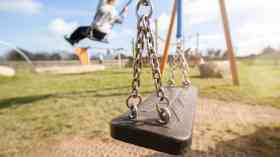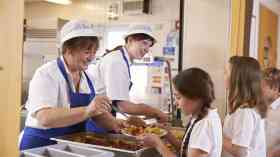
School meals: healthy and sustainable?
Educational environments are looking for ways to reduce their carbon footprint. Robyn Quick looks into how schools meals can play their part.
Children across the UK are increasingly concerned about the climate crisis. Charity organisation Save the Children conducted a survey, where 60 per cent of the young participants said they think climate change and inequality are affecting their generation’s mental health.
The survey found they often feel powerless, and wanted the government to do more to protect the world they will inherit.
Food waste is one of the biggest issues that needs to be tackled. Over one third of all food produced globally goes to waste, and the UK throws away around 9.5 million tonnes of food waste in a single year – even though 8.4 million people in the UK are in food poverty.
Additionally, school food is the biggest area of public sector food procurement in the UK. According to this month’s International Panel on Climate Change (IPCC) report, food systems are associated with roughly 42 per cent of global greenhouse gas emissions.
However, this is one aspect of climate action that young people can feel they can make real change, especially with the help of their teachers.
On top of this, statistics from Brunel University show that a total of 68,000 tonnes is generated by primary schools in England and 28,000 tonnes by secondary schools, giving a total food waste weight of 96,000 tonnes per year.
Growing and sourcing food sustainably can help students feel like they are playing a part in reducing this amount of food waste from schools, as well as improving their physical and mental health.
Here are some positives that come with sustainably sourcing school meals:
It improves education about waste
This is an obvious one, but it is one of the best reasons to grow food sustainably for schools.
Lowering the carbon impact of schools isn’t just a concern for children, as school staff and the government are saying they are dedicated to making change in the education industry.
UK landfill is nearing full capacity, which means it is not a suitable place to dispose of food waste.
Any food composting and reduction of waste, however small, makes a difference.
There have been increasing efforts in the past from the government to reduce the levels of food waste in households, businesses and public buildings. In 2022, the Department for Education released its strategy on environmental sustainability in education settings in England with action steps from now until 2030.
Food forms part of this plan and, by 2025, the School Food Standards will have been updated to include the impact of food emissions on the environment.
However, the new government has not detailed their plans for tackling food waste in education settings in their manifesto.
This means the future is uncertain in terms of firm plans that will be introduced by the government to reduce food waste especially in education, but schools have the opportunity to show students that change can still be made.
Instead of feeling helpless in the fight against the climate crisis, it can encourage them to learn about how to recycle and reduce waste. This may even result in students taking a more active role in food waste initiatives.
More learning opportunities
As well as reducing waste in schools, making meals sustainable can encourage students to have new experiences.
One way of involving students in the meal preparation is to set up a school garden. Fruit and vegetables grown in the garden can then be used for school meals, and encourage children to eat what they have produced.
Dr Bethan Stagg from the University of Exeter and Professor Justin Dillon, from UCL, assessed the evidence around teaching conservation and ecology.
She said: “Ecological gardens provide opportunities for in-depth observation of ecological interactions, develop empathy with living organisms and to increase interest in the natural environment and how our actions affect it. Active interactions with plants through gardening and planting activities, are particularly effective for fostering plant awareness.”
Working in a school garden provides a break from sitting in a classroom, and allows students to get stuck into more abstract hands-on learning.
In big UK cities like London or Birmingham, many children will not have been exposed to farming and growing methods. With gardens in an educational setting, they can learn to understand the natural growth of plants — from seeds to sprouts to flowers to fruits — and the impact that rain, drought and other forces of nature have on plant life.
Being exposed to green spaces on a regular basis has been proven to improve mental health for both adults and children. For example, Michael Marmot remarked in his 2010 review that “creating a physical environment in which people can live healthier lives with a greater sense of wellbeing is a hugely significant factor in reducing health inequalities”.
The RHS Campaign for School Gardening has a whole host of recommendations and tips for setting up these gardens.
Setting up a garden does not require any expertise, just enthusiasm, some tools and teamwork.
Students can have healthier school meals
Finally, sustainable meals often rely less on meat-based dishes and more on plant-based recipes. Almost five per cent of the UK population have a vegetarian or vegan diet, showing that more people are exploring different kinds of food. At the London Climate Action Week in July this year, the UK Children’s Parliament members endorsed plant-based school meals.
Harry Acheampong, former Youth prime minister, and Youth prime minister of Youth Parliament Clark Dearson both said they want to see sustainable plant-based meals available at all schools across the UK.
“We all need to think about incorporating more plant-based meals into our diets,” said Acheampong, as reported by the Daily Express.
Dearson added: “All schools should embrace the inclusion of plant-based ingredients in their menus.” Sourcing food from sustainable sources and expanding schools food menus can also introduce children to new diets and flavours.
Latest News
04/11/2025 - 09:55
The policy introduces the new Chief Regulator’s Rebuke - a new tool which can be used when an awarding organisation is found to have breached rules, but not in a way that warrants a financial penalty.
03/11/2025 - 10:04
The government has launched a new campaign supported by Sport England that aims to help parents discover simple ways to build movement into daily life during the winter months.
03/11/2025 - 09:55
Nearly eight in ten UK teachers have had to rethink how they set assignments because of Artificial Intelligence (AI), according to a new British Council survey.
31/10/2025 - 10:12
A growing number of UK children are now eligible for Free School Meals (FSM), yet most still aren’t taking advantage of them on a daily basis, new research reveals.
30/10/2025 - 01:28
In the wake of the Raac crisis, the DfE spent £5 million on research into the condition of school buildings, which is due to conclude in spring 2026.







